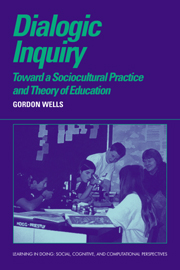Book contents
- Frontmatter
- Contents
- Conventions of Transcription
- Introduction
- Part I Establishing the Theoretical Framework
- Part II Discourse, Learning, and Teaching
- 4 Text, Talk, and Inquiry: Schooling As Semiotic Apprenticeship
- 5 Putting a Tool to Different Uses: A Reevaluation of the IRF Sequence
- 6 From Guessing to Predicting: Progressive Discourse in the Learning and Teaching of Science
- 7 Using the Tool-kit of Discourse in the Activity of Learning and Teaching
- 8 Making Meaning with Text: A Genetic Approach to the Mediating Role of Writing
- Part III Learning and Teaching in the zpd
- Appendix I A Social Constructivist Model of Learning and Teaching
- Appendix II Categories for the Analysis of Discourse
- References
- Index of Authors
- Index of Subjects
- Title in the series
8 - Making Meaning with Text: A Genetic Approach to the Mediating Role of Writing
Published online by Cambridge University Press: 09 November 2009
- Frontmatter
- Contents
- Conventions of Transcription
- Introduction
- Part I Establishing the Theoretical Framework
- Part II Discourse, Learning, and Teaching
- 4 Text, Talk, and Inquiry: Schooling As Semiotic Apprenticeship
- 5 Putting a Tool to Different Uses: A Reevaluation of the IRF Sequence
- 6 From Guessing to Predicting: Progressive Discourse in the Learning and Teaching of Science
- 7 Using the Tool-kit of Discourse in the Activity of Learning and Teaching
- 8 Making Meaning with Text: A Genetic Approach to the Mediating Role of Writing
- Part III Learning and Teaching in the zpd
- Appendix I A Social Constructivist Model of Learning and Teaching
- Appendix II Categories for the Analysis of Discourse
- References
- Index of Authors
- Index of Subjects
- Title in the series
Summary
There can be little doubt that Vygotsky had a keen interest in the development of writing. As we shall see below, he saw mastering written language as playing a critical role in the development of “the higher psychological functions.” However, apart from his chapter entitled “The Prehistory of Written Language” (1978), and one section of his chapter on the development of scientific concepts (1987), there is little in his translated works that addresses the subject of writing directly. Nevertheless, each of the main themes in his theory of learning and development provides a perspective on this topic and, in this chapter, I shall make reference to all of them. I shall start by considering the historical relationship between writing and speech.
Speech and the Development of Writing
Although the use of writing – as far as can be ascertained – is much more recent, in phylogenetic terms, than the use of speech, its origins are also shrouded in the mists of prehistory. However, the content and context of the earliest known written artifacts, which can be dated to some five thousand years ago, strongly suggest that the invention of writing followed the shift to a pastoral and agriculturally-based way of life and co-occurred with the development of large urban centers (Halliday, 1993b; Nicolopoulou, 1989). For in the more complex economy that resulted from settlement, a separation began to emerge between the processes of labor and the disposition of the products that were created and this, in turn, gave rise to the need to keep track of the type, quantity, and whereabouts of the products and also of those who produced them.
- Type
- Chapter
- Information
- Dialogic InquiryTowards a Socio-cultural Practice and Theory of Education, pp. 267 - 290Publisher: Cambridge University PressPrint publication year: 1999



